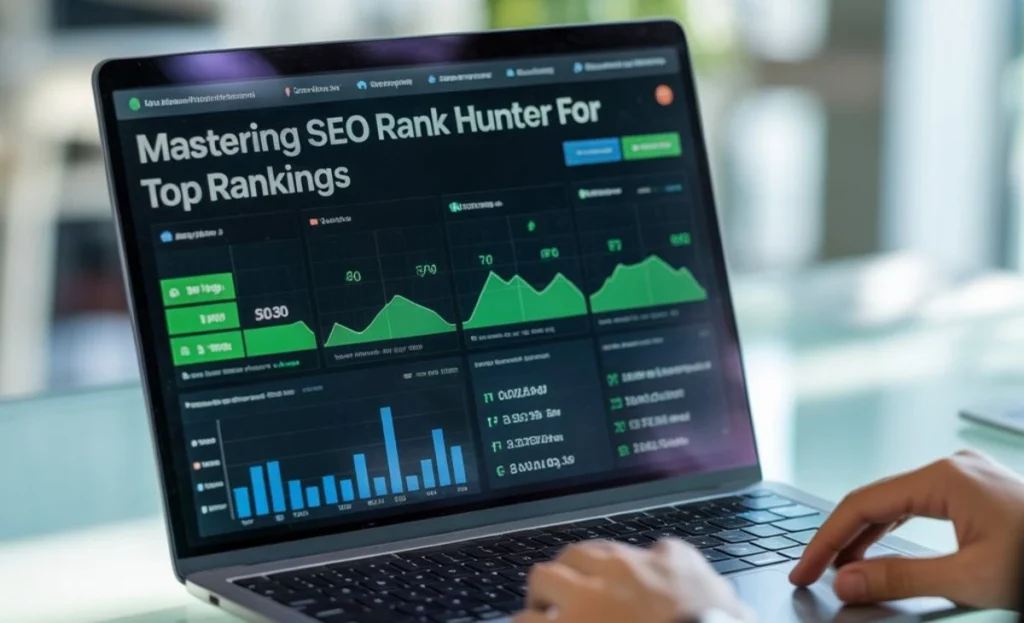In today’s highly competitive digital landscape, businesses, marketers, and content creators all share a common goal: achieving high visibility and ranking on search engines. The term “SEO rank hunter” has been emerging as a way to describe this mission—optimizing content and strategies to target and track rankings across various search engines like Google.
But what exactly does this mean, and how can you leverage the tools and strategies of an SEO rank hunter to drive measurable success? In this article, we’ll explore everything you need to know about SEO rank hunting, from the fundamental definition to actionable tips for improving your search rankings.
What Is an SEO Rank Hunter?
At its core, an SEO rank hunter refers to someone who actively seeks to improve their website’s ranking on search engines, with the primary focus being high-quality optimization to attract organic traffic. However, it’s more than just tracking rankings. An SEO rank hunter strategically employs tactics, tools, and analytical insights to identify opportunities and optimize content to perform better in search engine results pages (SERPs). This practice goes beyond keyword targeting and taps into data-driven decisions, competitor analysis, and advanced SEO techniques to keep content in the spotlight.
Why SEO Rank Hunting Matters
The value of ranking high in search engines cannot be overstated. Search engines are the primary way people find content, products, and services on the internet. If your website doesn’t show up on the first page of search results, you may miss out on significant amounts of organic traffic, which can directly affect your business’s bottom line.
The SEO rank hunter is not only focused on hitting the #1 position but also on maintaining long-term sustainable growth. It requires constant monitoring, refining, and evolving strategies to align with search engine algorithm updates and shifting user behaviors.
Benefits of SEO Rank Hunting
- Increased Organic Traffic: High rankings translate to more visibility and traffic, which can lead to higher conversions and sales.
- Cost-Effective Marketing: Compared to paid advertising, organic search traffic is free. Investing in SEO yields long-term returns, with less reliance on paid campaigns.
- Credibility and Trust: A strong position in search results builds brand authority and trust with your audience. Users tend to trust organic results more than ads.
- Competitive Edge: Being able to identify gaps in your competitors’ SEO strategies and outrank them positions your brand as a leader in your industry.
Key Challenges in SEO Rank Hunting
While the benefits are clear, SEO rank hunting comes with its own set of challenges. Understanding these obstacles is crucial for anyone aiming to master SEO optimization.
- Constant Algorithm Changes: Search engines, particularly Google, update their algorithms frequently. Staying up to date on these changes and adjusting strategies accordingly is a constant task for SEO rank hunters.
- Content Saturation: The internet is flooded with content. Standing out from the crowd and ranking higher than competitors requires continuous innovation and quality content creation.
- Technical SEO Issues: Factors like slow loading speeds, poor mobile optimization, or broken links can significantly hinder your ability to rank well in search results.
- Keyword Cannibalization: This occurs when multiple pages on your website compete for the same keyword, which can dilute your rankings and affect your visibility.
Real-World Applications of SEO Rank Hunting
To illustrate how SEO rank hunting works in real life, let’s consider a few case studies and examples of how different businesses and websites have succeeded with strategic SEO efforts.
Case Study 1: E-Commerce Growth
A small e-commerce brand specializing in eco-friendly products struggled to gain visibility despite offering great products. Their SEO rank hunter strategy involved targeting niche, long-tail keywords that other competitors were not focusing on. By optimizing product pages with high-value keywords and ensuring the site had excellent technical SEO (mobile responsiveness, fast load times), they climbed from the 5th page of Google to the first page in six months, leading to a 40% increase in organic traffic and a 25% boost in conversions.
Case Study 2: Local Business SEO
A local coffee shop with multiple locations was trying to dominate its geographic area in search results. By creating hyper-localized content (addressing local events, local coffee trends, and customer stories) and optimizing their Google My Business profile, the business improved local search visibility. It saw a 30% rise in foot traffic and a significant increase in online orders.
Tools and Platforms for SEO Rank Hunting
Several tools and platforms can aid in your SEO rank hunting efforts. These tools help with tracking keyword rankings, analyzing competitors, auditing websites, and measuring SEO performance.
- Ahrefs: A powerful tool for keyword research, competitor analysis, and backlink tracking. It’s perfect for finding untapped keywords and discovering backlink opportunities.
- SEMrush: Great for tracking rankings, conducting site audits, and analyzing competitors. It also offers insights into organic search traffic and keyword trends.
- Google Search Console: A free tool by Google that helps webmasters monitor their site’s performance, fix issues, and analyze search traffic.
- Moz: Known for its keyword research tools, site audit capabilities, and ranking trackers, Moz is an excellent resource for managing SEO campaigns.
- Ubersuggest: A budget-friendly SEO tool that offers insights into keywords, competitor analysis, and backlink tracking.
How to Become a Successful SEO Rank Hunter: A Step-by-Step Guide
To help you embark on your journey as an SEO rank hunter, here’s a step-by-step guide that outlines the essential actions you should take:
- Perform Keyword Research: Understand the search intent of your target audience. Use tools like Ahrefs, SEMrush, and Google Keyword Planner to find relevant keywords with high search volume and low competition.
- Optimize On-Page SEO: Ensure your content is well-structured. Use your target keyword in the title, URL, meta descriptions, and throughout your content naturally. Ensure internal links and proper header tags (H1, H2, H3) are in place.
- Improve Site Speed: A slow website can significantly hurt your rankings. Use tools like Google PageSpeed Insights to identify performance issues and work towards fixing them.
- Focus on Quality Content: Content is king. Provide value to your readers by creating well-researched, engaging, and informative content. Aim for a comprehensive approach to your topics, addressing all aspects of user queries.
- Monitor and Adjust: SEO is not a set-and-forget strategy. Regularly track your rankings, monitor competitors, and adjust strategies based on performance and algorithm changes.
- Build Quality Backlinks: Earning backlinks from reputable websites signals to search engines that your content is trustworthy and valuable.
Common Myths About SEO Rank Hunting
- SEO Is a One-Time Effort: SEO is an ongoing process. Even if you rank high today, changes in the algorithm or competition can affect your ranking.
- Keyword Stuffing Guarantees Rankings: Overloading content with keywords harms readability and may lead to penalties. Quality content always trumps keyword stuffing.
- Higher Rankings Equal More Traffic: Ranking in the top position doesn’t always guarantee more traffic. It’s about relevance to the user’s search intent, not just position.
Frequently Asked Questions (FAQ)
- What does SEO rank hunting involve?
SEO rank hunting involves optimizing your website and content to improve its position on search engine results pages, using strategies like keyword research, on-page SEO, and backlink building. - How long does it take to see results from SEO rank hunting?
It can take anywhere from 3 to 6 months to see noticeable results, depending on the competition and your SEO efforts. - Is SEO rank hunting the same as paid search advertising?
No, SEO rank hunting focuses on organic rankings through optimization, while paid search advertising involves paying for visibility in search results. - How do I track my SEO rank progress?
Use SEO tools like Ahrefs, SEMrush, or Google Search Console to track keyword rankings and analyze your SEO performance over time.
Conclusion
Becoming a successful SEO rank hunter is not about taking shortcuts. It requires understanding how search engine algorithms work and applying proven best practices consistently. Staying updated with the latest SEO trends is essential for long-term success. A strategic, data-driven approach helps improve your rankings, increase organic traffic, and boost online visibility. Focus on sustainable growth instead of chasing quick results. Start by using the steps outlined in this article, and take time to explore advanced tools and expert resources to refine your strategy even further.
Ready to become an SEO rank hunter? Start optimizing today and watch your rankings soar!







1 thought on “Mastering SEO Rank Hunter for Top Rankings”